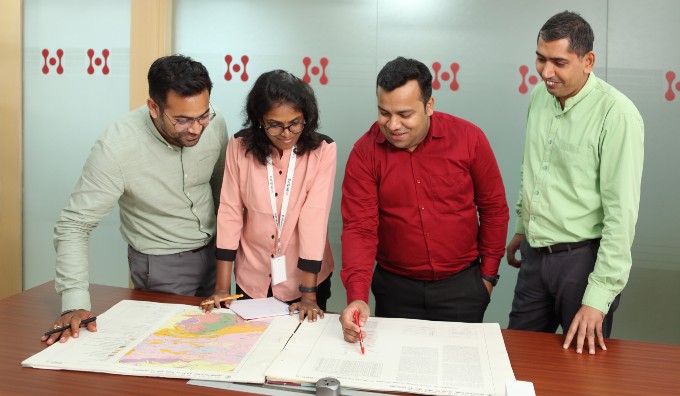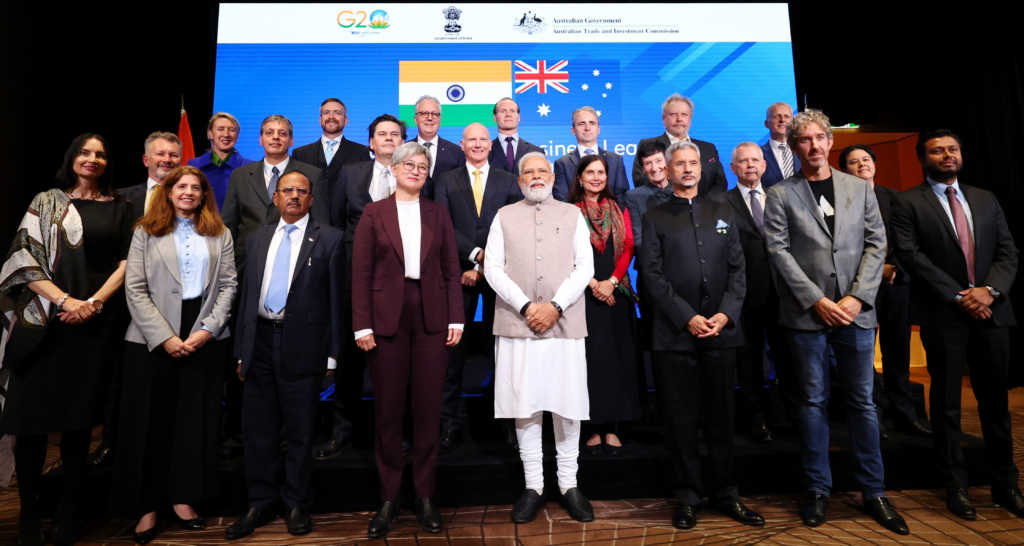THOUGHT LEADERSHIP
India and Australia can support each other’s clean energy journeys
The relationship between India and Australia goes far beyond our nations’ mutual love of cricket. We have deep people-to-people connections that have been formed over generations. At the beginning of the 20th century, around 7000 people of Indian descent lived in Australia. Now, Indian-born Australians number more than 750,000 – a number that has doubled over the last decade and continues to grow.

It’s natural that our two countries should have a strong relationship across many domains. We have strong strategic and political ties, and our economic engagement opportunities are massive. This will be strengthened even further with the Australia-India Economic Cooperation and Trade Agreement.
In a sign of the deepening India–Australia relationship, in 2023 Australia’s Prime Minister Anthony Albanese and India’s Prime Minister Narendra Modi have shared senior bilateral visits both in India and in Australia. One of the major themes in these meetings has been the potential for the two nations to support each other’s journeys towards a clean energy transition and net zero targets.
Building clean energy connections
I’ve been privileged to be involved in furthering the Australia–India relationship as a member of the Australian Senior Business Delegation to India and a subsequent Roundtable with business leaders in Sydney. During these meetings, I spoke about the potential our nations have, despite our radically different sizes, to work together to overcome challenges in our renewable energy sectors. I put forward the idea of a joint renewable energy council, which was well received. I am now on the Australia India CEO Forum’s Energy, Resources, Net Zero and Critical Minerals Joint Working Group, which had its first meeting this month. And this week, Entura has welcomed a visit from the High Commissioner of India to Australia, Manpreet Vohra, at our Hobart offices.

These opportunities have been realised after forging relationships with government officials across Australia and India over many years – and having maintained an Entura presence in India for more than 17 years with our highly skilled team based in New Delhi. Entura is a leader in the renewable energy industry and at present is the only Australia-based, government-owned business operating in the sector in India.
Entura is an excellent example of how Australia and India can support each other towards our clean energy goals. With India committed to net zero by 2070 and with 60% of its current energy production coming from coal, there are huge decarbonisation moves underway, including plans for 500 GW of renewable energy by 2030. Renewable electricity is growing at a faster rate in India than in any other major economy. Electricity demand is expected to double over the next decade and the share of wind, solar, hydropower, batteries and pumped hydro will lift as a proportion of the mix.
For Entura’s clients in India, we bring deep hydropower and pumped hydro capability and significant expertise in hybrid renewables systems, integrating distributed energy resources, resolving transmission challenges, and delivering bespoke, tailored training and capacity building through the Entura clean energy and water institute, with a particular focus on dam safety. For our projects in Australia, our India team brings a wealth of talent and a boost to capacity. They also have the local knowledge and connections that go a long way towards our success in clean energy and water projects across South Asia and South-east Asia.
Building on Entura’s long engagement with India, and from my involvement with the International Hydropower Association, I see the following areas as particularly important for our nations to focus on for mutual benefit in the energy transition.
1 Diversifying supply chains in critical minerals and renewable energy technologies
As both countries strive to achieve ambitious renewable energy targets, we will need to develop more diverse and resilient supply chains. The extraction and processing of critical minerals will be an essential area for cooperation. Mechanisms such as The India–Australia Critical Minerals Research Partnership and India–Australia Critical Minerals Investment Partnership will integrate Indian scientific, industry and government partners with CSIRO’s developing Critical Energy Metals Mission. This holds great potential to strengthen supply chains, add value to Australian exports, and support the commercialisation of critical minerals technology.
Another crucial factor in the success of Australia’s renewables, green hydrogen and green steel ambitions is the availability of components such as solar PV panels, batteries, electrolysers and electrical componentry. India is a powerhouse of manufacturing capability and could become a major supplier of these essentials to support Australia’s build-out of renewables. The announced joint taskforce on solar and the initiatives underway to collaborate on green hydrogen and green steel are encouraging developments.
2 People power and knowledge-sharing
Developing a skilled workforce, ready to take up the jobs of the future, is a make-or-break factor for the clean energy transition. As Entura has experienced, India has a deep pool of technical talent in renewable energy and a rising skilled workforce. To put it in context, India has over 1000 universities and some estimates suggest that these institutions are producing more than 1 million engineering graduates per year.
Australian businesses such as Entura benefit from having access to this talent – especially facing escalating skills and resources shortages in Australia – and we’ve found that with the right tools, methods and attitudes, our people across Australia and India can work seamlessly together in integrated teams, leveraging each other’s strengths on projects throughout the Indo-Pacific. Our India team adds diversity and capacity to our business – with the added bonus of optimising project delivery across time zones. We also benefit from the ability to build greater understanding of local conditions and regulations in India, and to forge strong networks and partnerships in the region.
Over the years, we’ve identified that despite the size of the potential renewable energy workforce, India still seeks greater skills development and expertise in hydropower, dam safety and the integration of renewable energy technologies. Entura’s clean energy and water institute (ECEWI) is a model of how long-term experience of developing and maintaining renewable energy assets, which we’ve gained through Tasmania’s century-long hydropower journey, can be shared across the world to build skills and capacity that extend far beyond the theoretical or academic.
Through ECEWI, we’ve delivered successful exchange programs, training workshops, and capacity-building initiatives in India, including dam safety training for India’s Central Water Commission as part of its Dam Rehabilitation and Improvement Project (DRIP) – and we’re now supporting the South Asia Regional Infrastructure Connectivity Framework (an initiative of the Australian Department of Foreign Affairs and Trade) by providing capability development on dam safety and cross-border power markets.
3 Innovation and best practice
There is enormous scope for Australia and India to work together to drive innovation in clean energy technologies and to share best practices and solutions. Many initiatives are already underway, drawing on Australia’s advanced technical expertise in solar and wind farms, energy storage solutions, and grid integration projects. For example, Entura is applying experience in India that we’ve gained in world-leading projects in Australia – such as our understanding of offgrid hybrid renewables systems gained from powering the Bass Strait islands, and the work our teams have led to identify and progress the first new pumped hydropower opportunities in Australia for decades in Tasmania and in Queensland.
As developers conduct concept studies and seek to secure licences for renewable projects, sharing international expertise such as ours will be an advantage. We are already applying our pumped hydro screening processes to identify new opportunities in India, and looking at the potential for repurposing disused mine sites for new renewable energy projects, as we are doing at the former Kidston gold mine in Queensland. We’re also applying our knowledge of repowering existing wind and solar farms in the quest for economical and sustainable approaches to boost electricity generation.
This brings me to another key area in which Australia can help to support a ‘fair’ clean energy transition in India. Australia has some of the strongest environmental and social requirements for clean energy projects in the world, and we’ve learned a lot about sustainability along the way. Entura has long been an advocate for sustainable projects conducted with integrity. In fact, I’ve just returned from the International Hydropower Association’s world congress, which reinforced this theme, announcing a new Hydropower Sustainability Alliance and the Bali Statement of Powering Sustainable Growth. Businesses like Entura can foster a fairer clean energy transition in India by promoting high standards of sustainability in all the projects in which we participate and the training we deliver.
Working together on the three factors I’ve discussed here will help build greater success, resilience and sustainability in all areas of the renewable energy transition. Lowering emissions in the global energy sector is an enormous and daunting endeavour that can’t be solved without international collaboration. But we’re at a very exciting point in the journey. We look forward to continuing the close and mutually beneficial relationship between our nations. Accelerating the global clean energy transition is the most important legacy we can leave today’s communities, future generations, and this planet we all share.
About the author
Tammy Chu is the Managing Director of Entura, one of the world’s most experienced specialist power and water consulting firms. She is responsible for Entura’s business strategy, performance and services to clients, and is part of Hydro Tasmania’s Leadership Group. As a civil engineer, Tammy specialised in the design and construction of mini-hydro and hydropower systems, project management, hydropower investigations, prefeasibility and feasibility studies, environmental assessments and approvals, resource investigations and resource water management. Tammy is a member of the Board of the International Hydropower Association. She was the first female and now past president of the Tasmanian Division of Engineers Australia, and was an Engineers Australia National Congress representative.
MORE THOUGHT LEADERSHIP ARTICLES
November 20, 2023





